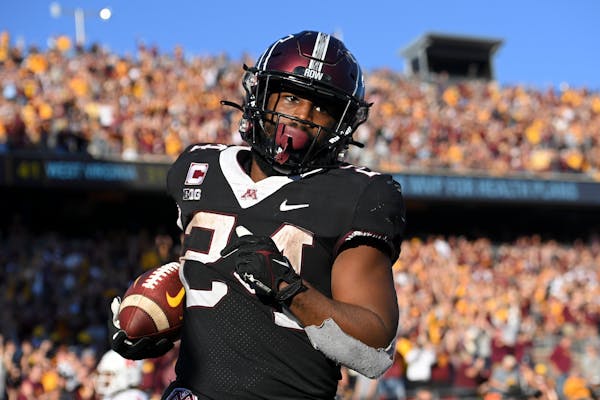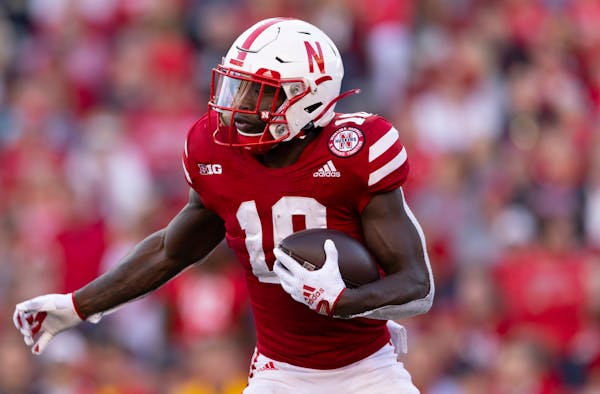The scoreboard read Gophers 31, Rutgers 0. The time of possession favored Minnesota by a 2-1 margin, 40:02 to 19:58. And the Gophers ran 84 offensive plays to the Scarlet Knights' 45.
Yet late Saturday afternoon, some fans and Gophers observers were left less-than-completely fulfilled with the second shutout victory of the season. Their concern: Where was the passing game?
Indeed, the Gophers ran the ball 53 times and passed it only 21, with quarterback Tanner Morgan completing 14 of those throws for 122 yards with no touchdowns or interceptions. Their longest gain through the air was 21 yards to tight end Brevyn Spann-Ford.
“We won 31-0. That's the point of the game: to win. How we win, it's going to be very different week in and week out. And maybe some people won't like that part, but that's OK.”
On Monday, coach P.J. Fleck explained his team's strategy against Rutgers. To paraphrase singer Billy Idol, "In the 1:30 p.m. hour, they cried Mo, Mo, Mo.''
"We talked to Mohamed [Ibrahim] and that he might have to be ready to carry the ball 35-40 times, and he did exactly that within a few numbers,'' Fleck said of his star running back, who ran 36 times for 159 yards and three touchdowns. "We knew it would be that type of game.''
Riding Ibrahim for 18 carries for 78 yards and two touchdowns, the Gophers went on drives of 99 yards over 19 plays and 86 yards over 13 plays to take a 14-0 lead in the second quarter. Those two marches consumed 10:37 and 7:03, shortening the game and leaving the Gophers in firm control of it.
"Fifteen teams before us, in a row, couldn't slow him down,'' Rutgers coach Greg Schiano said, referring to Ibrahim's 16th consecutive 100-yard rushing game.
Morgan, returning to the lineup after missing the previous week's game because of a concussion, went 7-for-9 for 82 yards on the first two possessions. He basically was left to manage the game and avoid mistakes for the final 2½ quarters.
"You make a game plan based on who you're going to play and what type of game you think it's going to be,'' Fleck said. "And then what you have available and what they're giving you.''
Fleck was asked Monday to evaluate his team's vertical passing game, especially since the Gophers might need more from it as soon as Saturday at Nebraska.
"There was not a lot of it,'' he said.
The stats certainly backed him up, with Morgan not throwing a pass that traveled 20 yards in the air and only four that went from 10 to 19 yards.
With his team up 14-0 with 2:01 left in the second quarter and Rutgers with the ball at its 15-yard line, Fleck played to get the ball back, using two timeouts.
When Minnesota's defense forced a three-and-out, Fleck planned to be aggressive with the passing game if the Gophers got good field position. Instead, Quentin Redding didn't field Adam Korsak's punt, and the 63-yard boot rolled dead at the Minnesota 22 with 1:29 left in the half. Much to the crowd's chagrin, Fleck avoided risk by calling three consecutive runs, ending the half.
"We call the timeouts, and we're gonna go attack,'' Fleck said. "Well, if we catch the punt, it's different, but it rolls 25 yards. … I've been in that situation before where we're up 14-0 and you get a sack, fumble and pickup, and it's 14-7.''
It's clear that Fleck doesn't have complete confidence in his deep passing game. Over the past three games, Gophers wide receivers have a total of 12 receptions for 166 yards.
"Two of the games that we lost I feel like was because of the vertical passing game,'' Fleck said, pointing to key interceptions in the losses to Illinois and Purdue, "and that maybe can make you hesitant.''
Call it conservative or cautious, in the end, Fleck got what he wanted.
"We won 31-0. That's the point of the game: to win,'' he said. "How we win, it's going to be very different week in and week out. And maybe some people won't like that part, but that's OK. … That's a sign of a program going in the right direction.''
Souhan: For Lynx star Napheesa Collier, "Phee" is just fine

Young Twins starters called up from minors to fill out rotation
David Festa's return to Twins goes south in a hurry

Vikings GM talks to the Star Tribune about the team's 2025 outlook, McCarthy's trajectory


